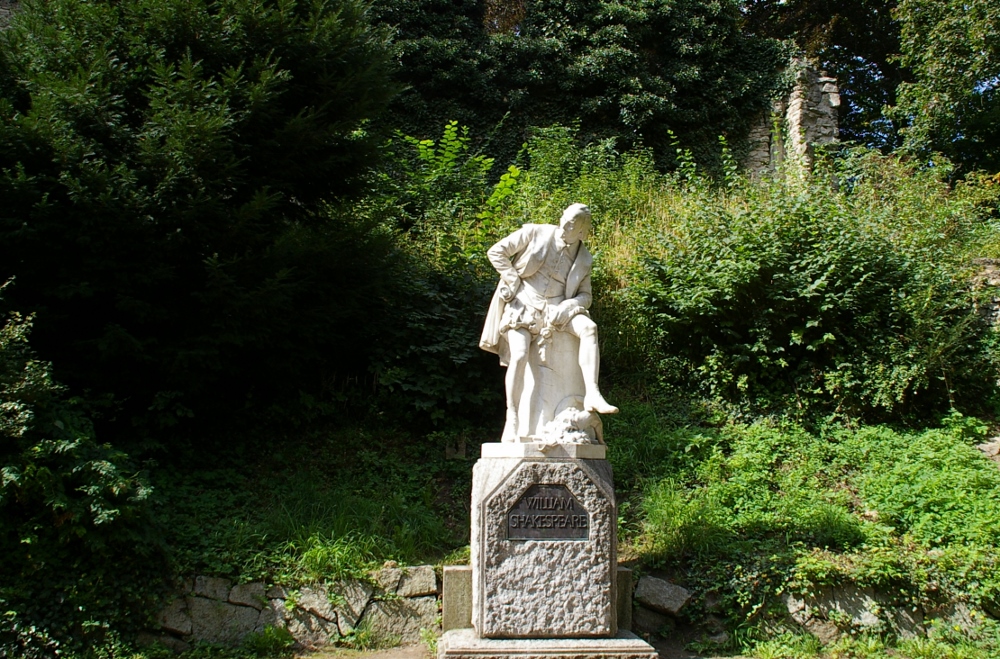
Statue of William Shakespeare in Weimar, Germany, pictured in 2008 (Wikimedia Commons/Rudolf Klein)
The spiritual journey is complex terrain, so many twists and turns, so many mountains and valleys, so many unknowns and thrills. The wise person seeks a guide.
People in medicine, economics or technology look for mentors to unravel the basic principles and practices of those fields. Traveling alone is dangerous. So whom shall we turn to for guidance in our journey from self to God?
Franciscans turn to St. Francis and St. Clare. Carmelites read the works of St. John of the Cross, St. Teresa of Avila and St. Thérèse of Lisieux. But what about individuals not called to a specific form of spirituality? Are there spiritual directors for the "common man or woman" immersed in our busy world?
What about William Shakespeare? The Bard of Avon has some profound insights into central realities in the spiritual life: prayer, forgiveness, compassion or love. Check these out.
Prayer
My words fly up, my thoughts remain below.
Words without thoughts never to heaven go.
("Hamlet," Act 3, Scene 3)
Hamlet's father, the King Claudius, kneels in prayer hoping to get away with his sins, not to ask forgiveness for crimes. The king realizes in the above passage that his prayer is basically invalid. It is simply a series of words without any remorse for his sins.
In our personal prayer life, there is a danger of words being severed from our thoughts and affections. While uttering the Our Father, we may be dreaming of what we will fix for supper or whether our favorite team will have a successful game. Words, mere words. Shakespeare asserts this disconnect short circuits authentic prayer.
Advertisement
Forgiveness
That cannot be, since I am still possessed
Of those effects for I did the murder:
My crown, mine own ambition, and my queen.
May one be pardoned and retain th' offense?
("Hamlet," Act 3, Scene 3)
Hamlet's father understood something of the nature of forgiveness. Unless he repents of his ambition that led him to murder his brother and then marry his brother's wife, he will not experience mercy. But he could not let go of the effects of his sins. He had no remorse that would open his soul to receive the mercy God waits to give.
Pardon awaits us all. We all need a redeemer to restore our broken relationships. The God revealed in Jesus is a God of love and mercy. Although that mercy and love is unconditional, we must be receptive to obtain this grace. The king was not properly disposed to such healing.
Love
Let me not to the marriage of true minds
Admit impediments. Love is not love
Which alters when it alteration finds …
("Sonnet 116")
The mystery of love is at the center of spirituality. This is a life of self-giving, of dying to one's selfishness and being for others. Our baptism invites us into the paschal mystery, the dying and rising Jesus witnessed for us. Being "for" and "with" others in their need fulfills the Lord's basic commandment.
Shakespeare's insight is that authentic love does not alter or admit of impediments. We witness this type of love in a spouse who continues to visit daily, even for years, a married partner with dementia. The marital love is not diminished, even though the sick partner is unable to communicate. Amazing grace!
Wise counsel
Throughout his plays and sonnets, the Bard offers nuggets of advice for us spiritual pilgrims. In "The Merchant of Venice," we listen attentively to Portia: "That light we see is burning in my hall. / How far that little candle throws his beams! / So shines a good deed in a naughty world" (Act 5, Scene 1). One act of kindness can transform a life.
In "King Lear," the king cries out: "Expose thyself to feel what wretches feel" (Act 3, Scene 4). Pope Francis has been urging all of us to such compassion. Go out to the margins and accompany those in dire need.
In "Sonnet 73," Shakespeare describes the ending of things: the autumn season, a day, a glowing fire. These are images of encountering our mortality. The sonnet concludes: "This thou perceiv'st, which makes thy love more strong, / To love that well, which thou must leave ere long." Again, the beautiful call to fidelity in the face of death.
Shakespeare knew well the human heart and the qualities of the spiritual journey — prayer, forgiveness, love, kindness, compassion. The insights tucked in his tragedies, comedies and sonnets speak profoundly of our spiritual journey.
[Bishop Robert Morneau, priest, poet and Packers' fan, is a retired auxiliary bishop of the Green Bay, Wisconsin, Diocese, and the author of many books of poetry, including The Color of Gratitude.]
Editor's note: We can send you an email every time Soul Seeing is published so you don't miss it. Go to our sign-up page and select Soul Seeing.







